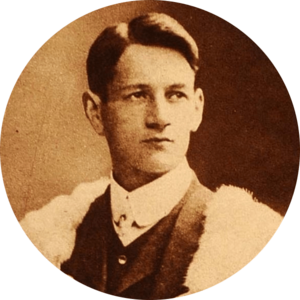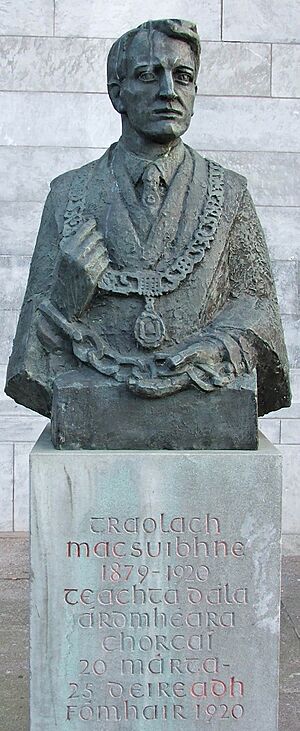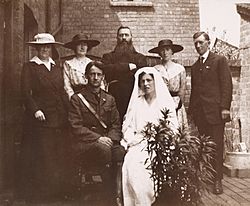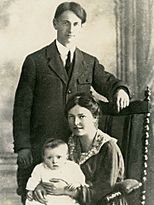Terence MacSwiney facts for kids
Quick facts for kids
Terence MacSwiney
|
|
|---|---|

MacSwiney in his mayoral robes
|
|
| Teachta Dála | |
| In office December 1918 – 25 October 1920 |
|
| Constituency | Cork Mid |
| Lord Mayor of Cork | |
| In office March 1920 – October 1920 |
|
| Constituency | Cork County Council |
| Personal details | |
| Born | 28 March 1879 Cork, Ireland |
| Died | 25 October 1920 (aged 41) HM Prison Brixton, London, England |
| Resting place | Saint Finbarr's Cemetery, Cork, Ireland |
| Spouse | Muriel Murphy |
| Children | Máire MacSwiney Brugha |
| Relatives |
|
Terence James MacSwiney (28 March 1879 – 25 October 1920) was an important Irish writer, politician, and leader. He became the Lord Mayor of Cork in 1920 during the Irish War of Independence. He was arrested by the British government for speaking out against them and was sent to Brixton Prison. His death there in October 1920, after going on a hunger strike for 74 days, made him and the Irish fight for independence known around the world.
Contents
Early Life and Education
Terence MacSwiney was born in Cork, Ireland, in 1879. He was one of eight children. His father, John MacSwiney, had been a teacher and later owned a tobacco factory. When his father moved to Australia in 1885, Terence and his siblings were raised by their mother and oldest sister.
Terence's mother, Mary, was English but strongly supported Irish independence. He went to school at the Christian Brothers' North Monastery school in Cork. He left school at 15 to help his family financially. Even while working as an accountancy clerk, he continued his studies. He earned a degree in Mental and Moral Science from the Royal University of Ireland in 1907.
In 1901, he helped start the Celtic Literary Society. In 1908, he co-founded the Cork Dramatic Society with Daniel Corkery. He wrote several plays for them. His play The Revolutionist (1915) was about a person taking a strong political stand. He also wrote short books about Irish history.
Political Journey
Terence MacSwiney was known as a thoughtful writer and intellectual. His articles in the newspaper Irish Freedom caught the attention of the Irish Republican Brotherhood. In 1913, he helped create the Cork Brigade of the Irish Volunteers. He also became the leader of the Cork branch of Sinn Féin. In 1914, he started his own newspaper, Fianna Fáil, but it was stopped after only 11 issues.
In 1915, MacSwiney met Muriel Murphy. She came from a wealthy family in Cork but had become interested in Irish culture and independence. They continued to see each other.
During the Easter Rising in April 1916, MacSwiney was supposed to be second-in-command for the Cork and Kerry areas. However, he stood down his forces based on orders from Eoin MacNeill. Muriel Murphy brought him food and information during this confusing time.
After the rising, MacSwiney was imprisoned by the British government until December 1916. He was held in prisons like Reading and Wakefield Gaol. In February 1917, he was sent out of Ireland and held in internment camps until June 1917. Muriel followed him to England to support him. They got married on 9 June 1917 in Bromyard, England. This happened one day after Muriel's 25th birthday, which meant she could access her inheritance. This helped them be independent from Muriel's family, who did not approve of their relationship.
In November 1917, MacSwiney was arrested in Cork for wearing an Irish Volunteers uniform. Inspired by Thomas Ashe, he went on a hunger strike for three days before being released.
In the 1918 Irish general election, MacSwiney was elected to represent Mid Cork for Sinn Féin. Instead of taking his seat in the British Parliament, he joined the first Dáil Éireann (the Irish Parliament). After his friend Tomás Mac Curtain, who was the Lord Mayor of Cork, was killed in March 1920, MacSwiney was elected to take his place as Lord Mayor.
On 12 August 1920, MacSwiney was arrested in Cork. He was accused of having "seditious articles and documents" (papers that encouraged rebellion) and a secret code key. He was quickly tried on 16 August and sentenced to two years in Brixton Prison in England.
Hunger Strike and Death
On the day he was imprisoned in Cork, 12 August, MacSwiney joined other prisoners who had started a hunger strike. He was soon moved to Brixton Prison, where he continued his hunger strike. On 26 August, the British government said that releasing him would cause big problems in Ireland.
MacSwiney's hunger strike became known worldwide. The British government faced threats of boycotts from Americans. Four countries in South America asked the Pope to help. Protests also took place in Germany and France. An Australian politician, Hugh Mahon, was removed from parliament for speaking out against the British government's actions.
Food was often placed near MacSwiney to try and make him stop his hunger strike. In his final days, attempts were made to force-feed him. On 20 October 1920, he fell into a coma. He died five days later, on 25 October, after 74 days on hunger strike.
His body was laid in St George's Cathedral, Southwark in London, where 30,000 people came to see him. To prevent large protests in Dublin, the authorities sent his coffin directly to Cork. His funeral in the Cathedral of St Mary and St Anne on 31 October drew huge crowds. MacSwiney is buried in the Republican plot in Saint Finbarr's Cemetery in Cork.
Lasting Impact

A collection of his political writings, called Principles of Freedom, was published after his death in 1921. It was based on articles he wrote for Irish Freedom between 1911 and 1912.
MacSwiney's life and actions had a special impact in India. Jawaharlal Nehru, a leader in India, was inspired by MacSwiney's example. Mahatma Gandhi also said MacSwiney influenced him. Principles of Freedom was translated into several Indian languages. The Indian revolutionary Bhagat Singh admired MacSwiney. When Singh's father asked the British government in India to pardon his son, Bhagat Singh quoted Terence MacSwiney, saying, "I am confident that my death will do more to smash the British Empire than my release." He told his father to withdraw the request. Bhagat Singh was executed on 23 March 1931.
Other important figures who were influenced by MacSwiney include Ho Chi Minh, a Vietnamese leader. He was working in London when MacSwiney died and said, "A nation that has such citizens will never surrender." On 1 November 1920, a Catalan group in Barcelona held a demonstration where a poet, Ventura Gassol, read a poem praising MacSwiney. Chinese poet Guo Moruo also wrote a poem about him.
In Ireland, MacSwiney's sister Mary MacSwiney took his seat in the Dáil. She spoke against the Anglo-Irish Treaty in January 1922. His brother Seán MacSwiney was also elected in the 1921 Irish elections for another Cork area. He also opposed the Treaty.
MacSwiney's hunger strike set an example for future hunger strikers. Large strikes happened across Ireland in 1923.
In 1945, his only child, Máire MacSwiney, married Ruairí Brugha. Ruairí was the son of another nationalist leader, Cathal Brugha. Ruairí later became a politician himself. Máire MacSwiney wrote a book about her life called History's Daughter: A Memoir from the Only Child of Terence MacSwiney (2006). She passed away in May 2012.
A collection of items related to MacSwiney's life is kept at Cork Public Museum. His portrait and a painting of his funeral mass are displayed in Cork's Crawford Art Gallery.
There is also a secondary school in Cork City named after him, with a room dedicated to his memory.
Writings
- The Music of Freedom, by 'Cuireadóir' (poems; Cork: The Risen Gaedheal Press, 1907).
- Fianna Fáil: The Irish Army: A Journal for Militant Ireland, weekly publication edited and mainly written by MacSwiney; Cork, 11 issues (September to December 1914).
- The Revolutionist; a play in five acts (Dublin & London: Maunsel and Co., 1914) Internet Archive.
- The Ethics of Revolt: A Discussion from a Catholic Point of View as to When it Becomes Lawful to Rise in Revolt Against the Civil Power, by Toirdhealbhach Mac Suibhne (pamphlet, 1918).
- Battle-cries (poems, 1918).
- Principles of Freedom (Dublin: The Talbot Press, 1921).
- Despite Fools' Laughter. Poems by Terence MacSwiney; edited by B. G. MacCarthy (Dublin: M. H. Gill and Son, 1944).
Famous Quotes
- "It is not those who can inflict the most, but those who can suffer the most who will conquer."
- "I am confident that my death will do more to smash the British Empire than my release." (About his hunger strike)
- "I want you to bear witness that I die as a Soldier of the Irish Republic." (His last words to a priest)
- "If I die the fruit will exceed the cost a thousand fold. The thought of it makes me happy. I thank God for it."
See also
- Families in the Oireachtas
- Kevin Barry
- List of members of the Oireachtas imprisoned during the Irish revolutionary period
 | May Edward Chinn |
 | Rebecca Cole |
 | Alexa Canady |
 | Dorothy Lavinia Brown |



